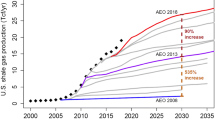Abstract
After defining scientific forecasting, the crucial role of assumptions in such forecasts is explicated. This is followed by a discussion of the representations upon which forecasting systems are based. Six variables are then introduced to capture differences in socio-political forecasting circumstances: level of detail, accuracy, agreement on problem representation, robustness-brittleness, number of variables and interdependencies, and disturbance. A categorization of forecasting approaches - expert based, Bayesian, extremal statistical, and rule based - is offered. These forecasting approaches are then cross-referenced with the forecasting circumstances to produce recommendations for choosing an appropriate forecasting technique in a given policy circumstance. Most examples in the article are drawn from the realm of foreign policy and international politics, and the cross-referencing section concentrates on foreign energy policy examples.
Similar content being viewed by others
References
Ando, A. and Simon, H. A. (1963). “Aggregation of variables in dynamic systems,” in Ando, A., Fisher, E. and Simon, H. (eds.) Essays on Structures of Social Science Models. Cambridge: M.I.T. Press.
Ashley, R. (1978). “Bayesian decision analysis in international relations forecasting: the analysis of subjective processes,” in Choucri, N. and Robinson, T. (eds.) (1978).
Azar, E., Bennett, J. and Sloan, T. (1974). “Steps toward forecasting international interactions,” Peace Science Society (International) Papers, Vol. 23.
Bobrow, D. (1978). “Considerations for effective forecasting,” in Choucri, N. and Robinson, T. (1978).
Choucri, N. and Robinson, T. (eds.) (1978). Forecasting in International Relations: Theory, Methods, Problems, Prospects. San Francisco: W. H. Freeman and Company.
Christensen, C. (1978). “The forecasting potential of international relations theories,” in Choucri, N. and Robinson, T. (eds) (1978).
Ellsberg, D. (1972). “Quagmire myth and the stalemate machine,” in Ellsberg, D., Papers on War. New York: Simon and Schuster.
Helmer, O. (1978). “The use of expert opinion in international relations forecasting,” in Choucri, N. and Robinson, T. (eds.) (1978).
Hilsman, R. (1967). To Move a Nation: The Politics of Foreign Policy in the Administration of John F. Kennedy. Garden City: Doubleday and Company.
Lamb, D. (1970). “Information for foreign policy decision-making: information systems development in the department of state.” Unpublished Masters Thesis. Cambridge: M.I.T.
Leavitt, M. (1978). “Computer simulation in international relations forecasting,” in Choucri, N. and Robinson, T. (eds.) (1978).
MORS Proceedings (1974). Proceedings of the Forecasting for Planning Working Group, 34th Symposium for Military Operation Research Society. Fort Eustis, Virginia, December 3–5.
O'Leary, M. and Coplin, W. (1974). “A report on project quest.” Paper presented at the 1974 Annual Meeting of the American Political Science Association, Chicago, August 29–September 2.
Phillips, W. (1976). “Forecasting roles in policy planning.” Unpublished paper, University of Maryland, College Park.
Polyani, M. (1962). Personal Knowledge: Toward a Post-Critical Philosophy. New York: Harper and Row.
Rothstein, R. (1972). Planning, Prediction and Policymaking in Foreign Affairs. Boston: Little Brown and Co.
Steinbruner, J. (1968). “The mind and milieu of policy-makers: a case study of the MLF.” Unpublished Ph.D. dissertation. Cambridge: M.I.T.
Sylvan, D. (1978). “Critically examining some common assumptions and sources of error in international relations forecasting,” International Interactions 5: 59–73.
Thorson, S. (1976). The Utilization of the Behavioral Sciences in Long Range Forecasting and Policy Planning, Vol. 1. Columbus: The Ohio State University Research Foundation.
Waterman, D. A. (1977). “Rule-directed interactive transaction agents: an approach to knowledge acquisition,” R-2171-ARPA. Santa Monica: The Rand Corporation.
Wolf, F. L. (1962). Elements of Probability and Statistics. New York: McGraw-Hill.
Author information
Authors and Affiliations
Rights and permissions
About this article
Cite this article
Sylvan, D.A., Thorson, S.J. Choosing appropriate techniques for socio-political forecasting. Policy Sci 12, 265–282 (1980). https://doi.org/10.1007/BF00138156
Issue Date:
DOI: https://doi.org/10.1007/BF00138156




